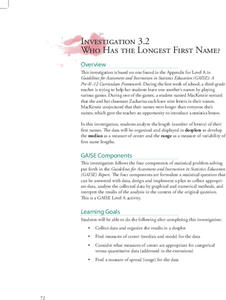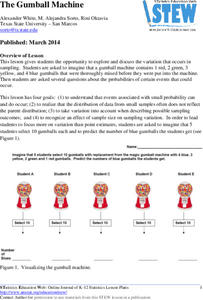NASA
Using Models in Climate Change Research
Explore models through the relevant lens of climate change! Investigators watch a video about using models and their application for evaluating temperature data and climate change. Scientists read an article on climate change and answer...
NASA
Seasonal Science: Building Claims from Evidence
A lot can change in a year! Investigators observe a video of Earth over the course of a year and complete a KWL chart. Astronomers view a second video, participate in a guided discussion, and discuss the rubric for successfully...
NASA
Data Literacy Cube: Global Atmospheric Temperature Anomaly Data
Evaluate global temperature anomalies using real-world data from NASA! Climatologists analyze a data set using a literacy cube and differentiated question sheets. Team members evaluate global temperature anomaly data with basic...
NASA
Behavior Over Time: Analyzing Seasonal Soil and Air Properties
Moisture can affect air temperatures and so much more! An analysis of NASA soil moisture data allows pupils to make connections between climate and weather features. They first review general data and then select a specific location to...
NASA
Blossoms Blooming: Analyzing Plant Growth Patterns
Could the seasons be changing? Using National Park data, learners recognize patterns in the growth of seasonal plants. They look specifically at the first bloom date of cherry blossoms in Washington DC and compare them to temperature...
NASA
Hurricanes as Heat Engines
Hurricanes are a destructive yet fascinating phenomenon. Individuals examine evidence that hurricanes use thermal energy from the ocean as they approach land. Learners use images, charts, and graphs to collect data and then draw...
National Endowment for the Humanities
Theme Analysis in A Christmas Carol
Why does Charles Dickens have Ebenezer go from scrooge to light-hearted and generous? From "Bah, humbug!" to "God Bless Us, Every One!" After rereading Dickens' preface to A Christmas Carol, learners analyze quotations from the tale that...
National Endowment for the Humanities
Scrooge as He is Revealed during the Ghostly Experiences
Readers learn how to use both direct and indirect characterization clues provided by Charles Dickens to understand the complexity of Ebenezer Scrooge's character. Scholars collect evidence of comments Scrooge hears, how he responds to...
National Endowment for the Humanities
Language Analysis Based on Stave 1
Class members meet the original scrooge, the Dickens character whose name has become synonymous with a cold-hearted, tight-fisted, miser. Using the provided worksheet, readers closely examine context clues to determine the meanings of...
Franklin D. Roosevelt Presidential Library & Museum
Role Playing Relating to Big Decisions
While most high schoolers are too young to vote, they still need to learn the skills needed to solve problems. The ninth resource in a 10-part civics series presents class members with four "What Would You Do?" scenarios that have them...
Franklin D. Roosevelt Presidential Library & Museum
Voting and Participation in Decision Making
"If you don't vote - you don't count." That's the big idea in this resource about voting and participation in the democratic process. The three included activities focus students on being informed voters, practicing voting for their...
Franklin D. Roosevelt Presidential Library & Museum
Practice Passing Laws
Getting a bill through the legislative process to become a law in the United States is a very long and difficult procedure by design! To understand the deliberation, debate, and compromises involved, class members take on the role of...
American Statistical Association
Who Has the Longest First Name?
Name that statistic! Classmates each write their name and the number of letters in it on a sticky note to place on the board. As a class, they determine the median, mode, and range of the name lengths, and create a dot plot of the data....
American Statistical Association
The Gumball Machine
Chew on an activity for probability. Given information on the number of gumballs in a gumball machine, scholars consider how likely it is to randomly draw a blue gumball and how many of each color they would draw in 10 trials if the...
American Statistical Association
The Mean and Variability from the Mean
Discover the mean from fair share to the balance point. The lesson takes small groups of pupils through two different interpretations of the mean, the fair share understanding of the mean, and the balance point. Scholars use the...
Franklin D. Roosevelt Presidential Library & Museum
The Power of Propaganda in Shaping Civic Actions and Understanding
Propaganda posters are powerful. Using images from The Art of War: American Poster Art 1941-1945 exhibit, young historians analyze the symbols, images, colors, and text used to rally support for World War II. Through seven activities,...
British Council
Forced to Wear a Skirt
What's the dress code? Scholars read brief texts about school uniforms and discuss opinions for and against them. Pupils then work with a partner to role play a conversation about school uniforms.
British Council
Christmas
Pupils learn more vocabulary and English language by taking a close look at the words Happy Christmas and working in groups to see how many words they can make of the letters. Scholars then take a quiz to test their knowledge about...
Franklin D. Roosevelt Presidential Library & Museum
Service Learning Projects
Service learning projects provide pupils an opportunity to put the theories they are learning about civics into practice. Scholars investigate the needs of their community and then adopt a project for them to become involved in.
Franklin D. Roosevelt Presidential Library & Museum
The Constitution
Three activities focus on the need to have rules. Young historians are first challenged to suggest rules for their classroom and then to create their own constitution that balances the need for freedoms and protections. The third...
Franklin D. Roosevelt Presidential Library & Museum
What Does It Mean to Be an American?
A series of four activities focuses young scholars' attention on what it means to be an American. They identify key qualities, values, and virtues they consider shared by Americans. Participants then pretend they have been selected to...
Franklin D. Roosevelt Presidential Library & Museum
Pearl Harbor Activity #7: Pop Up Video Activity
A pop-up video version of FDR's "Day of Infamy" speech engages scholars in depending their understanding of the attack on Pearl Harbor. After watching the video, class members select five new things that they learned and research how...
Franklin D. Roosevelt Presidential Library & Museum
Pearl Harbor Activity #6: December 7 and September 11 - Infamy Twins?
Why did attackers on December 7, 1941, and on September 11, 2001, choose the targets they did? That is one of several questions young historians try to answer as they compare and contrast the two attacks. They also consider the...
Franklin D. Roosevelt Presidential Library & Museum
Pearl Harbor Activity #5: The Medium Matters
Young journalists learn that how we get our news and information matters in a collaborative social studies activity. The class is divided into three groups with the first analyzing a transcript of FDR's "Day of Infamy" speech, the second...

























